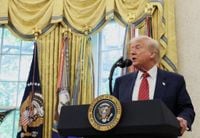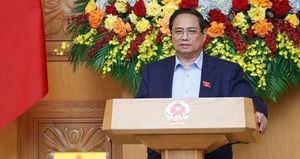In a significant development for international trade, President Donald Trump announced on May 8, 2025, the conclusion of the first free trade agreement between the United States and the United Kingdom. This announcement, made during a press conference at the White House, marks a pivotal moment in U.S.-UK relations and sets the stage for future trade negotiations.
Trump's announcement came after a series of global tariff policies that have reshaped the landscape of international commerce. During the press conference, Trump stated, "Today is a very important and exciting day for both the United States and the United Kingdom," emphasizing the historical significance of the agreement. He expressed pride in the UK being the first country with which the U.S. has finalized a trade deal following the implementation of new tariffs.
The agreement includes a reduction of tariffs on certain British automobiles from 25% to 10%, effectively easing the financial burden on UK manufacturers. In return, the UK has agreed to lower non-tariff barriers on American products, which could enhance market access for U.S. goods such as beef and ethanol. The UK is also expected to purchase $100 billion worth of Boeing aircraft as part of this trade pact.
While the deal has been hailed as a historic achievement, experts caution that it may serve more as a framework for future negotiations rather than a comprehensive trade agreement. According to reports, the specifics of the agreement are still under discussion and will be finalized in the coming weeks.
Market reactions to the announcement have been positive. Following Trump's declaration, the Dow Jones Industrial Average rose by 140.98 points (0.34%), closing at 41,254.95. The S&P 500 and Nasdaq indices also experienced gains, reflecting investor optimism about the potential for further trade agreements. Analysts noted that the successful conclusion of this agreement could pave the way for more negotiations with other countries.
However, there are concerns regarding the vagueness of the agreement's details. Major news outlets have suggested that while the U.S. and UK have reached a broad consensus, the lack of specific commitments may limit the immediate impact of the deal. A report from Deutsche Bank highlighted that comprehensive trade agreements typically take years to negotiate, indicating that this agreement may only scratch the surface of deeper economic ties.
In light of these developments, Trump hinted at the potential for additional trade agreements with other key allies, stating, "There are many other agreements in advanced stages of negotiation." This suggests that the administration is actively seeking to leverage this initial success to foster further international partnerships.
The trade agreement with the UK follows Trump's announcement of reciprocal tariffs on May 2, 2025, which were set to take effect on a country-by-country basis. Notably, Trump suspended these tariffs for 90 days for all countries except China, allowing time for negotiations to progress. This strategic move has been interpreted as an effort to alleviate tensions with trading partners while pursuing favorable trade terms.
UK Prime Minister Kia Starmer participated in the announcement via video conference, expressing optimism about the agreement's potential to enhance trade and create jobs. He referred to the deal as a tribute to the longstanding historical ties between the two nations, underscoring its significance in promoting mutual economic growth.
While the initial agreement has generated enthusiasm, experts caution that the road ahead may still be fraught with challenges. The complexities of international trade negotiations often involve intricate discussions on tariffs, non-tariff barriers, and other regulatory issues. As highlighted by trade attorney Tim Brightbill, the agreement may serve as a starting point for discussions on various trade-related topics, including digital commerce and agricultural products.
Looking ahead, the Trump administration is reportedly focused on concluding agreements with other nations, including India and Israel. Treasury Secretary Scott Besant and USTR representative Jamie Greer are scheduled to meet with Chinese officials in Geneva on May 10-11, 2025, to initiate tariff negotiations, signaling that the administration is keen on expanding its trade portfolio.
In conclusion, the U.S.-UK trade agreement represents a significant milestone in the Trump administration's trade policy. While the immediate effects on the economy remain to be seen, the potential for further agreements could reshape the future of U.S. trade relations. As negotiations continue, all eyes will be on how this initial agreement influences future discussions with other global partners.

![[속보] 트럼프, 영국과 첫 무역합의 확인…](https://thumbor.evrimagaci.org/YLjq7t6VqrrGh7nymMfaw2fRd5c=/200x0/tpg%2Fsources%2F2139f908-9ec8-462c-adc4-96bab7eeea67.jpeg)



